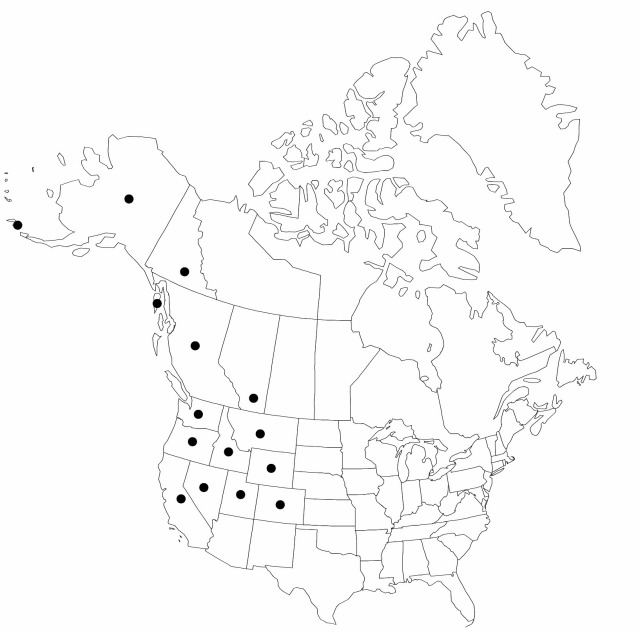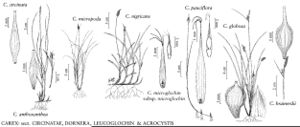Difference between revisions of "Carex micropoda"
Mém. Acad. Imp. Sci. St.-Pétersbourg Divers Savans 1: 210, plate 6. 1831.
FNA>Volume Importer |
imported>Volume Importer |
||
| (4 intermediate revisions by 2 users not shown) | |||
| Line 6: | Line 6: | ||
|place=1: 210, plate 6. 1831 | |place=1: 210, plate 6. 1831 | ||
|year=1831 | |year=1831 | ||
| + | }} | ||
| + | |special_status={{Treatment/ID/Special_status | ||
| + | |code=F | ||
| + | |label=Illustrated | ||
}} | }} | ||
|basionyms= | |basionyms= | ||
| Line 11: | Line 15: | ||
|name=Carex crandallii | |name=Carex crandallii | ||
|authority=Gandoger | |authority=Gandoger | ||
| + | |rank=species | ||
}} {{Treatment/ID/Synonym | }} {{Treatment/ID/Synonym | ||
|name=Carex jacobi-peteri | |name=Carex jacobi-peteri | ||
|authority=Hultén | |authority=Hultén | ||
| + | |rank=species | ||
}} {{Treatment/ID/Synonym | }} {{Treatment/ID/Synonym | ||
|name=Carex pyrenaica subsp. micropoda | |name=Carex pyrenaica subsp. micropoda | ||
|authority=(C. A. Meyer) Hultén | |authority=(C. A. Meyer) Hultén | ||
| + | |rank=subspecies | ||
}} {{Treatment/ID/Synonym | }} {{Treatment/ID/Synonym | ||
|name=Carex pyrenaica var. mondsii | |name=Carex pyrenaica var. mondsii | ||
|authority=Kelso | |authority=Kelso | ||
| + | |rank=variety | ||
}} | }} | ||
|hierarchy=Cyperaceae;Carex;Carex sect. Dornera;Carex micropoda | |hierarchy=Cyperaceae;Carex;Carex sect. Dornera;Carex micropoda | ||
| Line 34: | Line 42: | ||
|habitat=Moist meadows, stream banks, seeps, snowbeds and areas irrigated by meltwater | |habitat=Moist meadows, stream banks, seeps, snowbeds and areas irrigated by meltwater | ||
|elevation=10–4000 m | |elevation=10–4000 m | ||
| − | |distribution=Alta.;B.C. Yukon;Alaska;Calif.;Colo.;Idaho;Mont.;Nev.;Oreg.;Utah;Wash.;Wyo.;Eurasia (Japan;Russia). | + | |distribution=Alta.;B.C.;Yukon;Alaska;Calif.;Colo.;Idaho;Mont.;Nev.;Oreg.;Utah;Wash.;Wyo.;Eurasia (Japan;Russia). |
|discussion=<p>There is as much variation within the Rocky Mountain <i>Carex</i> crandallii as between C. crandallii and <i>C. micropoda</i> of Alaska and British Columbia. J. A. Calder and R. L. Taylor (1968) reported a weak distinction between a predominately distigmatic coastal race (“micropoda”) and a tristigmatic one (“pyrenaica”) from the interior. T. V. Egorova (1999) illustrated the shapes of perigynia for C. pyrenaica and <i>C. micropoda</i>, and the differences are consistent with what others have noted. Nevertheless, until a more reliable set of characters is found to distinguish these two taxa, all of the North American plants shall be treated as <i>C. micropoda</i>. W. A. Weber and R. C. Wittmann (1992) maintain the North American plants distinct from the European C. pyrenaica at the rank of species, a view that is accepted here. A thorough, worldwide review of relationships among taxa is warranted.</p> | |discussion=<p>There is as much variation within the Rocky Mountain <i>Carex</i> crandallii as between C. crandallii and <i>C. micropoda</i> of Alaska and British Columbia. J. A. Calder and R. L. Taylor (1968) reported a weak distinction between a predominately distigmatic coastal race (“micropoda”) and a tristigmatic one (“pyrenaica”) from the interior. T. V. Egorova (1999) illustrated the shapes of perigynia for C. pyrenaica and <i>C. micropoda</i>, and the differences are consistent with what others have noted. Nevertheless, until a more reliable set of characters is found to distinguish these two taxa, all of the North American plants shall be treated as <i>C. micropoda</i>. W. A. Weber and R. C. Wittmann (1992) maintain the North American plants distinct from the European C. pyrenaica at the rank of species, a view that is accepted here. A thorough, worldwide review of relationships among taxa is warranted.</p> | ||
|tables= | |tables= | ||
| Line 44: | Line 52: | ||
-->{{#Taxon: | -->{{#Taxon: | ||
name=Carex micropoda | name=Carex micropoda | ||
| − | |||
|authority=C. A. Meyer | |authority=C. A. Meyer | ||
|rank=species | |rank=species | ||
| Line 54: | Line 61: | ||
|habitat=Moist meadows, stream banks, seeps, snowbeds and areas irrigated by meltwater | |habitat=Moist meadows, stream banks, seeps, snowbeds and areas irrigated by meltwater | ||
|elevation=10–4000 m | |elevation=10–4000 m | ||
| − | |distribution=Alta.;B.C. Yukon;Alaska;Calif.;Colo.;Idaho;Mont.;Nev.;Oreg.;Utah;Wash.;Wyo.;Eurasia (Japan;Russia). | + | |distribution=Alta.;B.C.;Yukon;Alaska;Calif.;Colo.;Idaho;Mont.;Nev.;Oreg.;Utah;Wash.;Wyo.;Eurasia (Japan;Russia). |
|reference=None | |reference=None | ||
|publication title=Mém. Acad. Imp. Sci. St.-Pétersbourg Divers Savans | |publication title=Mém. Acad. Imp. Sci. St.-Pétersbourg Divers Savans | ||
|publication year=1831 | |publication year=1831 | ||
| − | |special status= | + | |special status=Illustrated |
| − | |source xml=https:// | + | |source xml=https://bitbucket.org/aafc-mbb/fna-data-curation/src/2e0870ddd59836b60bcf96646a41e87ea5a5943a/coarse_grained_fna_xml/V23/V23_994.xml |
|genus=Carex | |genus=Carex | ||
|section=Carex sect. Dornera | |section=Carex sect. Dornera | ||
Latest revision as of 20:44, 5 November 2020
Plants densely cespitose, tuft-forming; rhizomes inconspiuous. Culms 5–30(–40) cm. Leaves involute, 0.25–1.5(–2) mm wide. Pistillate scales light to dark brown, ovate, shorter than to as long as perigynia, apex obtuse to acute, apex and distal margins frequently hyaline, scarious. Perigynia ascending to spreading even reflexed at maturity, light green becoming straw colored, 3–4(–5) (including stipe) × 1–1.3 mm; beak dark brown, much shorter than body of perigynium. Stigmas 2(–3). 2n = 62 (Chukotka).
Phenology: Fruiting Jul–Aug.
Habitat: Moist meadows, stream banks, seeps, snowbeds and areas irrigated by meltwater
Elevation: 10–4000 m
Distribution

Alta., B.C., Yukon, Alaska, Calif., Colo., Idaho, Mont., Nev., Oreg., Utah, Wash., Wyo., Eurasia (Japan, Russia).
Discussion
There is as much variation within the Rocky Mountain Carex crandallii as between C. crandallii and C. micropoda of Alaska and British Columbia. J. A. Calder and R. L. Taylor (1968) reported a weak distinction between a predominately distigmatic coastal race (“micropoda”) and a tristigmatic one (“pyrenaica”) from the interior. T. V. Egorova (1999) illustrated the shapes of perigynia for C. pyrenaica and C. micropoda, and the differences are consistent with what others have noted. Nevertheless, until a more reliable set of characters is found to distinguish these two taxa, all of the North American plants shall be treated as C. micropoda. W. A. Weber and R. C. Wittmann (1992) maintain the North American plants distinct from the European C. pyrenaica at the rank of species, a view that is accepted here. A thorough, worldwide review of relationships among taxa is warranted.
Selected References
None.
